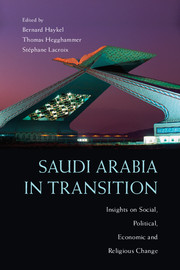3 - The Dogma of Development
Technopolitics and Power in Saudi Arabia
Published online by Cambridge University Press: 05 January 2015
Summary
In late September 2009 Saudi Arabia celebrated the grand opening of the King Abdullah University of Science and Technology (KAUST) near Jeddah overlooking the Red Sea. KAUST’s founders harbored great ambition for the new institution, declaring that they hoped to see it become “a globally renowned graduate research university that makes significant contributions to scientific and technological advancement, and will play a crucial role in the development of Saudi Arabia and the world.” In a tribute to Islam’s rich scientific history, King Abdullah, for whom the university is named, declared it a new “house of wisdom,” a reference to the center of research founded in ninth-century Baghdad. The original House of Wisdom was the site of considerable scientific and intellectual achievement, where for more than three centuries Muslim thinkers made seminal contributions to the study of mathematics, astronomy, and medicine. Mongol invaders razed the center in the thirteenth century. Their destruction did not undo the foundational work carried out there or undermine the achievement of its contributors. In encouraging and supporting the construction of a new “house of wisdom,” Abdullah announced that the “University shall be a beacon for peace, hope, and reconciliation and shall serve the people of the Kingdom and benefit all the peoples of the world in keeping with the teachings of the Holy Quran, which explains that God created mankind in order for us to come to know each other. It is my desire that this new University become one of the world’s great institutions of research; that it educate and train future generations of scientists, engineers and technologists; and that it foster, on the basis of merit and excellence, collaboration and cooperation with other great research universities and the private sector.”
- Type
- Chapter
- Information
- Saudi Arabia in TransitionInsights on Social, Political, Economic and Religious Change, pp. 31 - 47Publisher: Cambridge University PressPrint publication year: 2015
References
- 4
- Cited by



